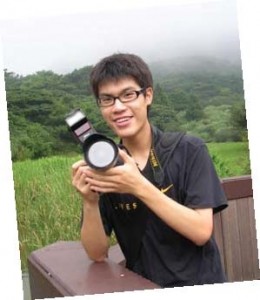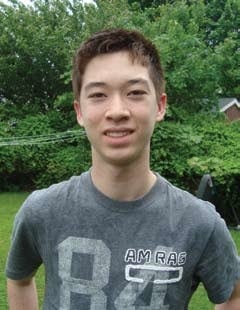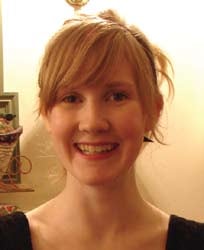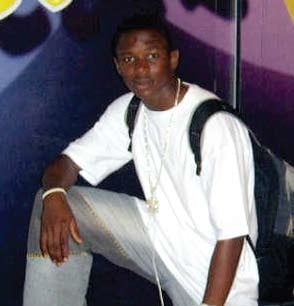In their quest for admittance to the Whiting School this fall, all 4,490 high school applicants were asked to complete a personal essay. The goal, in the words of the Hopkins Admissions team? “To help us to become acquainted with you as a person and student, apart from courses, grades, test scores, and other objective data.” Below we bring you a sampling of four such essays—heartfelt, revealing, and sometimes quirky—from students who have been accepted and will join the freshman class here in September.
The World I Come From
By Tiras Lin
 Eight hours of English and eight hours of Mandarin-this is how a typical day of mine adds up. Throw in a few more hours of Taiwanese, and maybe one or two of Spanish and my day starts over again.
Eight hours of English and eight hours of Mandarin-this is how a typical day of mine adds up. Throw in a few more hours of Taiwanese, and maybe one or two of Spanish and my day starts over again.
For my parents, plans for my future were simple: I was to turn in my homework, get good grades, and go to a well-known college. Both of them work in the field of software engineering and also manage their own company. No pressure.
They live in a delicate matrix that translates into a safe, defined path when it comes to taking care of me. E-mail client. Debug program. Ship USB key overseas. Raise kid. Being a good mathematician and scientist was a no-brainer-we left creativity for the Others to ponder. And something about being Asian, something about my culture, kept me and my parents focused. Integrals, vectors, hydroxyl groups-these things guaranteed a secure future.
But the rules of that world were too strict for me. Every year when I show my parents my course selections for the coming year, I am also leading them on a hike into alien territory. Multivariable Calculus and Chamber Ensemble? Advanced Physics and Advanced Photography? Arts smacked of a dismal financial future! I can follow rules in my math classes, but what am I supposed to do in my arts classes? An Arts formula simply didn’t exist.
From my early high school years, I had a strong interest in becoming an architect. The study includes all my loves-graphics design, working in 3D, math-it seemed like the perfect match. But my internship in Taitung, Taiwan, at a popular architecture firm last summer brought the stark realities of the study of architecture to my attention.
What if no one liked my designs? What if I ran out of assignments? I saw firsthand, for nearly a month and a half organizing blueprints in airconditioned offices and talking to sweaty workers at construction sites, why my parents were concerned. Architecture became less of a dream career and I’ve gradually placed my creative outlets elsewhere.
I was moving past the security that my parents had prescribed, and becoming more and more motivated by my experiences on stage and behind my camera viewfinder. But I’m not a rebel to my parents in any way though-that was a fragile line I decided that I couldn’t afford to cross. Instead, I’ve built up my creative side to include traces of structure. What others consider a creative writing assignment I consider a chance to show off my neurotic precision. When others see an open-ended photo project, I see a chance to calculate exposure and map out the world around me. The classical “Asian-insurance” that my family worked so hard to create was not destroyed, but rather tweaked to fit my state-of-the-art perspective of the Rules.
The variables keep changing, but somehow I’ve been able to fit myself into the system; my mind has become subtly “un-Taiwanese.” And now it is my burden to move into the future without forgetting my past, to thrive in my own microcosm without abandoning my parents’.
Tiras Lin grew up in San Rafael, California, where he attended the Marin Academy High School.
Yellow Jersey
By Roger Henry
 During my early days of recreational soccer, my favorite game was keep-away. The game was more of a drill, Coach’s futile effort to build in us a sense of unity and camaraderie: “You bunch up too much,” he used to say. “You need to learn to think like a team.” The rules are simple: There are two teams, one red and one blue. To score a point, a team has to maintain possession of the ball for at least 10 passes. Additionally, a neutral player wearing a yellow jersey can help whichever team currently has the ball. Being neutral was best because rarely did I have the freedom to be on both sides of a game, to not have to choose who to make my enemy and my friend. I loved it because, at the end of the day, I could revel in the glory of winning and still lament with the losers. After that I always knew the yellow jersey had to be mine.
During my early days of recreational soccer, my favorite game was keep-away. The game was more of a drill, Coach’s futile effort to build in us a sense of unity and camaraderie: “You bunch up too much,” he used to say. “You need to learn to think like a team.” The rules are simple: There are two teams, one red and one blue. To score a point, a team has to maintain possession of the ball for at least 10 passes. Additionally, a neutral player wearing a yellow jersey can help whichever team currently has the ball. Being neutral was best because rarely did I have the freedom to be on both sides of a game, to not have to choose who to make my enemy and my friend. I loved it because, at the end of the day, I could revel in the glory of winning and still lament with the losers. After that I always knew the yellow jersey had to be mine.
Many areas of my life have this same characteristic impartiality. I’ve grown up on the very border between the City of Trenton and the Hamilton suburb. Looking east, down Hamilton Avenue, I can see the city where I was born. Sadly, like many cities Trenton is an empty shell of its old self, a reminder of a previous time of business and prosperity. People I know talk of Trenton as if it is some disease, as if by associating with the city they’ll likely be infected with it, engulfed by it: “When are you going to move out of there?” my aunt asks. “The neighborhood is getting worse and worse.” When you look west of my street, straight into Hamilton Township, the opposite effect occurs. As if through a curtain you move from the squalor of the city to the comfort of the suburbs, from row houses to colonials with backyards and clean sidewalks. Since Trenton is so close, I’m forced to act in any way I can; volunteering at Trenton Junior Golf Program and serving at Loaves and Fishes soup kitchen has become more of a neighborly obligation than social charity. Going to school in another state every day has only magnified this economic dichotomy. With my parents’ generosity I’ve had the chance to attend a prep school in Pennsylvania despite our already tight budget. Statewide differences are more apparent to me than anyone else at my school, like the way my peers say “copybook” instead of “notebook,” and how New Jersey drivers are clearly safer than Pennsylvanian drivers. Being “in the middle” of everything thus gives me a unique kind of social awareness that parallels that of the neutral player in keep-away. Knowledge of the big picture gives me more responsibility, but I wouldn’t have it any other way.
That yellow jersey also has a physical hold on me, as it is held permanently and inextricably in my flesh. Ethnicity has been one of the biggest issues in my life because, being both Irish and Chinese, not even my race is a uniform color. I used to be thoroughly ashamed of being bi-racial- why wasn’t I just born one or the other? Once, during a shadow day at my current high school someone asked me point-blank, “would you rather be White or Asian?” If I were Caucasian I would fit in more with my family, since most of my mom’s side is still overseas. My dad’s side is 100% Irish, bordering on nationalistic. Being all-Irish would mean going to the annual Hibernians dinner without feeling like an outsider, maybe even joining my cousin Sean in Lia Fail, his bagpipe troupe. It would also mean meeting the status quo, blending in physically with my peers and some 65 percent of the nation. Being completely Asian, on the other hand, would afford me some other opportunities that I’ve longed to possess. Having no relatives from China or Indonesia in the United States, that culture is all but lost. As much as I feel alienated from the white and Asian cultures, however, I recognize the special chance I have to bridge the gap between them. At C.A.F.E (Cultural Awareness for Everyone), my school’s ethnic discussion group, we often talk about the cultural differences between Asian-American and European-American teen lifestyles. Having a mother who came from a family of 13 children, I can understand why population density is a large reason that Asian children are often instilled with a competitive spirit. Ethnic diversity has thus given me another rare chance to empathize with contrasting groups of people.
My entire life has been a series of these “keep-away” games, with teams that are divided economically, socially, or ethnically. In each game I have, for better or worse, been that one neutral player, stuck between two spheres. What I’ve learned, however, relates to something F. Scott Fitzgerald once said: “I was within and without, simultaneously enchanted and repelled by the inexhaustible variety of life.” Given the chance, I would never pick a side for the same reason I wouldn’t when playing soccer. Diversity made me who I am, forced me to be conscious of both sides of any issue. College eliminates those distinctions and gives everyone a neutral yellow jersey. Luckily, I know this position well.
Roger Henry, who attended the all-boys Holy Prep High School in Pennsylvania, earned an 800 on the writing portion of the SAT.
Minority Report
By Hannah Bands
 Although I have gained important academic knowledge during my high school career, my experiences with a diverse group of friends have had an equal impact on the way I think and prepared me to live in a diverse world. My middle school had some diversity but most of the students were, like me, white middle class preteens whose families had been in the U.S. for generations. I was used to going to school with girls who looked like me, ate the same food as me, and had the same amount of money as I did. While most of my peers chose Catholic high schools, I decided to go to an urban public magnet school. I grew up in an ethnically mixed neighborhood, and I was eager to go to school with a different group of peers. I was aware that the demographic at my high school would be very different (majority African American and largely low-income) and I knew that I would need to get used to a very different group of peers and environment quickly.
Although I have gained important academic knowledge during my high school career, my experiences with a diverse group of friends have had an equal impact on the way I think and prepared me to live in a diverse world. My middle school had some diversity but most of the students were, like me, white middle class preteens whose families had been in the U.S. for generations. I was used to going to school with girls who looked like me, ate the same food as me, and had the same amount of money as I did. While most of my peers chose Catholic high schools, I decided to go to an urban public magnet school. I grew up in an ethnically mixed neighborhood, and I was eager to go to school with a different group of peers. I was aware that the demographic at my high school would be very different (majority African American and largely low-income) and I knew that I would need to get used to a very different group of peers and environment quickly.
What I did not anticipate was the ease with which I would transition into this new world. There were, of course, many surprises. For example, frugality was not something to be scorned as stinginess, but a virtue to be praised. Although it seemed that we were not always speaking the same language, conversations we had about racial and class tensions were not at all tense. I found discussions of affirmative action, for example, to be fascinating, as my classmates represented a group that I had never heard speaking on this topic. Although I had anticipated being an ethnic minority, I did not realize that I would also be a gender minority. Most of my teachers and fellow students in my accelerated math and science courses were male. This trend has become more pronounced as the years have gone on, so that I am now the only female left in my math class. Again I found that keeping an open mind leads to an exposure to new points of view.
When I started working at a psychology lab, I again found myself different from everyone else. I was almost entirely surrounded by Asian American undergraduate and graduate students. I learned about Asian American culture in two ways simultaneously; from a theoretical perspective through the papers I read, and a practical perspective from my fellow researchers, many of whom were born in China or Korea. Some of the most enlightening experiences for me are the conversations that I have had with other research assistants about what they knew about the United States before coming here, and how they felt after arriving. Many had a narrow view of the United States, and had formed conclusions about this country through, for example, the television show Gossip Girl, about upper-class teens in Manhattan. This suggested to me that I am perhaps just as ignorant about other cultures as they were about mine, and that a culture cannot be understood through only a few sources. It showed me that I should be careful in drawing conclusions about another group of people.
I also encountered a new group of people outside of an academic setting around this same time. Although when I joined my fencing club there were many young people, soon my sister and I were the only long-term members under 40 years old. This could have meant that I would have no friends at fencing, but instead I befriended the other fencers who serve double-duty as mentors and pals to me. They share their wisdom about everything from literature to lessons from their own lives.
My time spent as a minority in almost every sense has changed the way I look at the world, especially with regard to inter-group communication. My most immediate gain is exposure to many different cultural perspectives, as well as an appreciation for individual differences within each group. I also now feel much more comfortable talking to people whose lives are quite different from my own, because I know that discussions of even the most controversial topics are likely to be rewarding in the end. I feel confident that I can find friends and be comfortable surrounded by almost any group of people.
A graduate of Baltimore Polytechnic Institute, Baltimore Scholar Hannah Bands decided she wanted to attend Johns Hopkins when she was in the first grade. She is a member of the Dean’s Innovation Group-students selected for their academic success and independent research.
Turning Point
By Tobechukwu Madu
 Every morning in Africa, a gazelle wakes up. It knows it must run faster than the fastest lion or it will be killed. Every morning a lion wakes up. It knows it must outrun the slowest gazelle or it will starve to death. It doesn’t matter if you’re a lion or a gazelle, when the sun comes up, you’d better be running. – African Proverb
Every morning in Africa, a gazelle wakes up. It knows it must run faster than the fastest lion or it will be killed. Every morning a lion wakes up. It knows it must outrun the slowest gazelle or it will starve to death. It doesn’t matter if you’re a lion or a gazelle, when the sun comes up, you’d better be running. – African Proverb
I wasn’t a lion or a gazelle. Yet, from the fall of 2001 through to the summer of 2005, I was running in a race, an exhilarating one. Those four years in Lumen stand out as the most outstanding period of my life. I call it the turning point of my life. The setting was a hybrid cross between a military academy and a monastery disguised to look like a learning institution. It was officially called Lumen Christi International High School (L.C.I.H.S) even though the closest it got to being “international” was a faculty member from neighboring Cameroon. This was where I got the first four years of my secondary school; in a village in Nigeria. It was my first place of exposure to the “real” world; an all-boys, ultra-conservative, Catholic boarding school that did not mirror anything about the world I’d be facing later on but taught me all I needed to know.
Life was a routine for 980 days. Like an Olympic 10,000km race, one turned around the same bends every time, each and every single time. Every day, the race began at the stroke of dawn…
…5:00…the school bell jingles and it’s time to get up from the sweetsoothing dream of home and face one more day of the torture euphemistically referred to as “school.” I reluctantly get up from my bed only to find out that my bucket of water which was supposed to be under my nbunk is missing. Since the school is located in a water-deficient society, water was gold and as a result student-thieves resort to stealing other people’s water in the middle of the night. First lesson of the day; like in the real world some people work hard for the wrong reasons and sometimes there’s nothing you can do about it. Luckily, 30 minutes later I fetch another bucket of water, wash myself and get ready for the day. Today is a really good day, sometimes I am not able to get water and then I dress up in my filth bathed in an overdose of deodorant and walk slowly to the chapel. 6:00…the morning prayers are said followed by a mass during which morals (food for the spirit) that would last for a lifetime are instilled into my little mind. By 7:00, the mass is ended and we have to go in peace to do our morning chores which takes roughly 15 minutes. I had to sweep a long line of corridors, but that was better than having to wash the communal pit toilets. After that, there is the communal breakfast (never enough). 7:45 sees us at the daily assembly after which classes from 8:00am till 2:00pm dominate our life (12:00…we say the angelus). In this school, an average student takes 15 subjects. Education is a clear priority. After school, there is lunch and an hour-long siesta. By 4:00, we walk back to class clumsily for a 90-minute prep (study) session. Then there is the one hour of game time that I spend playing soccer and goofing around with friends. 6:30…evening prayers, 7:15…dinner, 8:00… prep (again?), 10:00…night prayers and then the long awaited …bedtime…10:30…
…It wasn’t a race of physical power nor dexterity but rather one of endurance; enduring nostalgia at the age of nine. A race that forced you to keep holding on, practicing, fighting, studying with hope that all this hard work will come to fruition. This race, I kept on running all those years till I found myself in the Netherlands. Then I ran. And I practiced. And I ran again. Wait, you had to practice before running? You ran for a medal? You ran for something? You ran for a prize? I was stunned!
1,095 days later, I still think about the three most important events of the day; prayer for the spirit, food and exercise for the flesh, and academic knowledge for the mind. These principles imbibed from the years spent at Lumen Christi International High School, Uromi, Edo State, have made me the individual that I am. After juggling hours of religious studies mixed with the more conventional secondary school curriculum in such a sub-standard environment as in Lumen, a day in the American School of the Hague (A.S.H.) even with the rigorous curriculum, is paradise. After 14 years in Nigeria, the race to be run at A.S.H.-an international, American, co-ed, ultrasecular private school-remains a worthwhile enjoyable challenge. It gives me the experience of a universal educational training from two worlds, two continents, two countries. It is not over though; the last 100m of the 400m final is yet to be run in the Netherlands before I move yet again. Move to another world, another continent, another country. Like every competent athlete, eager for the next challenge, the next race, adventure, competition. No fear. Bring it on.
Tobechukwu Madu was born in Nigeria and spent the first 14 years of his life in the Niger Delta region. Four years ago he moved to the Netherlands, where he recently completed high school at the American School of the Hague.




